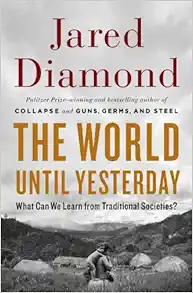
Description
From Publishers Weekly In the Pulitzer-Prize-winning Guns, Germs, and Steel , Diamond chronicled the rise of human civilizations since the Ice Age. This time, he turns over the log and probes the rotted side--the demise of once-productive societies such as the Maya, Easter Islanders and Greenland Norse. He also sounds the alarm on environmental practices undermining modern societies, including China, Russia, Australia and the United States. Narrator Murney has his work cut out for him, even though this audiobook is abridged. The narrative, which spans the globe and the ages, is dense, overwhelmingly so at times. Diamond parses myriad ecological, geographical and biological impacts, from weather patterns to deforestation to sperm count. But Murney rises to the occasion. His engagement never flags, and he strikes all the proper notes of concern and warning. The delivery feels effortless, his tone a blend of newsreel narrator and professor-at-the-lectern. Diamond teaches geography at UCLA, and his prose style, unsurprisingly, contains shades of the lecture hall. In fact, given such abundant and oft-alarming information, listeners may feel the urge to take notes for the final exam. Though grounding materials such as photographs and maps would have made this audiobook easier to follow, their absence is a minor fault in an overall fine production. Copyright © Reed Business Information, a division of Reed Elsevier Inc. All rights reserved. "Mr. Diamond...is a lucid writer with an ability to make arcane scientific concepts readiily accesible to the lay reader, and his case studies of failed cultures are never less than compelling."— The New York Times "...Collapse is a magisterial effort packed with insight and written with clarity and enthusiasm."— Businessweek "Guns, Germs, and Steel and Collapse represent one of the most significant projects embarked upon by any intellectual of our generation. They are magnificent books: extraordinary in erudition and originality, compelling in their ability to relate the digitized pandemonium of the present to the hushed agrarian sunrises of the far past. I read both thinking what literature might be like if every author knew so much, wrote so clearly and formed arguments with such care."—Gregg Easterbrook, The New York Times Book Review Jared Diamond is a professor of geography at the University of California, Los Angeles. He began his scientific career in physiology and expanded into evolutionary biology and biogeography. Among his many awards are the National Medal of Science, the Tyler Prize for Environmental Achievement, Japan’s Cosmos Prize, a MacArthur Foundation Fellowship, and the Lewis Thomas Prize honoring the Scientist as Poet, presented by The Rockefeller University. His previous books include Why Is Sex Fun? , The Third Chimpanzee , Collapse , The World Until Yesterday, and Guns, Germs, and Steel , winner of the Pulitzer Prize. From AudioFile In everyday language, Professor Diamond writes of the ecological collapse and subsequent decline of past societies. From the ravage of Australia by rabbits to the inability of the Mayas to supply their armies with food, we learn from the historical record how the misunderstanding and abuse of natural resources have destroyed cultures and made places on Earth uninhabitable. In a firm and raspy voice, Christopher Murney keeps a comfortable pace and doesn't stumble on a single word from the rich vocabulary. By finding the right tonal balance between being informative and entertaining, he renders a stimulating performance of science with a vital lesson for our future. J.A.H. © AudioFile 2005, Portland, Maine-- Copyright © AudioFile, Portland, Maine Read more
Features & Highlights
- In his million-copy bestseller
- Guns, Germs, and Steel
- , Jared Diamond examined how and why Western civilizations developed the technologies and immunities that allowed them to dominate much of the world. Now in this brilliant companion volume, Diamond probes the other side of the equation: What caused some of the great civilizations of the past to collapse into ruin, and what can we learn from their fates?
- As in
- Guns, Germs, and Steel
- , Diamond weaves an all-encompassing global thesis through a series of fascinating historical-cultural narratives. Moving from the Polynesian cultures on Easter Island to the flourishing American civilizations of the Anasazi and the Maya and finally to the doomed Viking colony on Greenland, Diamond traces the fundamental pattern of catastrophe. Environmental damage, climate change, rapid population growth, and unwise political choices were all factors in the demise of these societies, but other societies found solutions and persisted. Similar problems face us today and have already brought disaster to Rwanda and Haiti, even as China and Australia are trying to cope in innovative ways. Despite our own society’s apparently inexhaustible wealth and unrivaled political power, ominous warning signs have begun to emerge even in ecologically robust areas like Montana.
- Brilliant, illuminating, and immensely absorbing,
- Collapse
- is destined to take its place as one of the essential books of our time, raising the urgent question: How can our world best avoid committing ecological suicide?
- Read by Christopher Murney.



